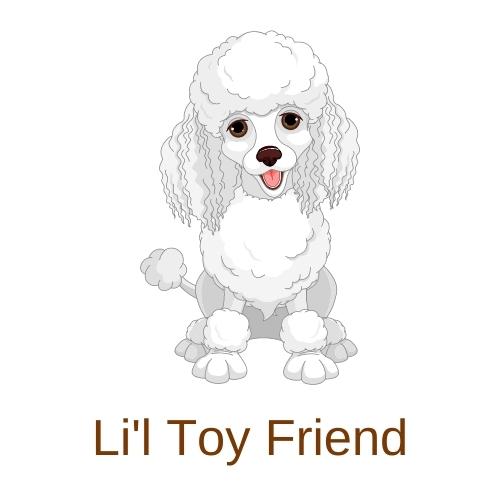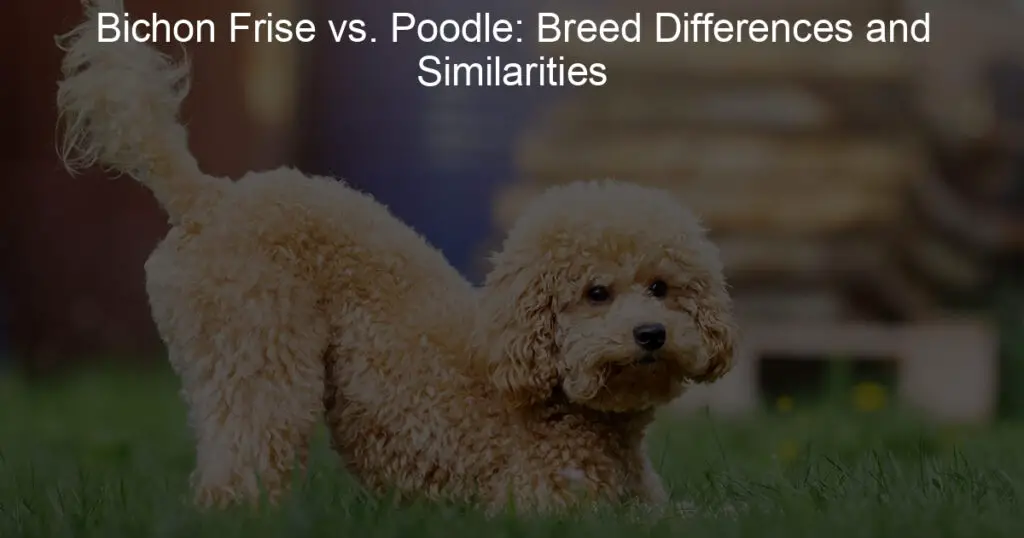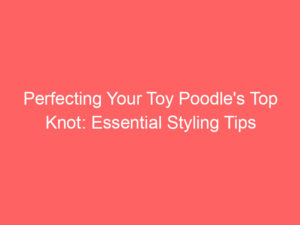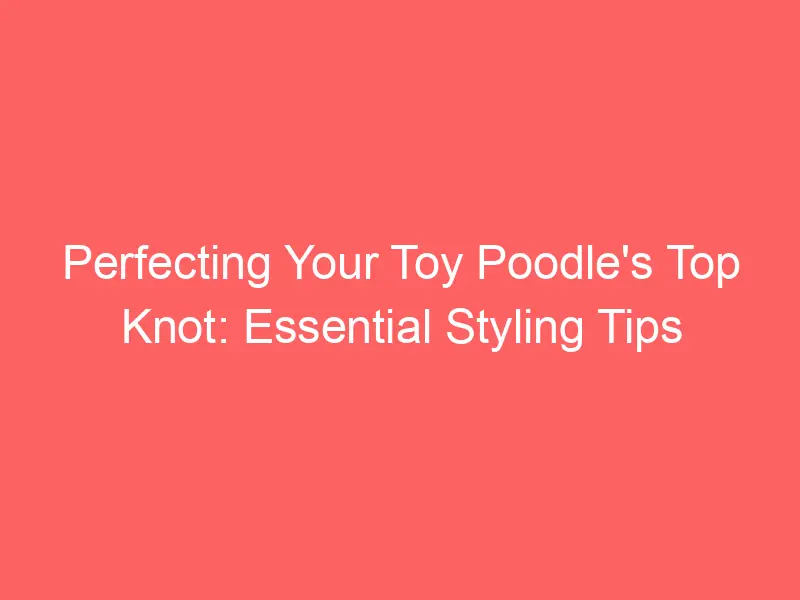Introduction to Bichon Frise and Poodle Breeds
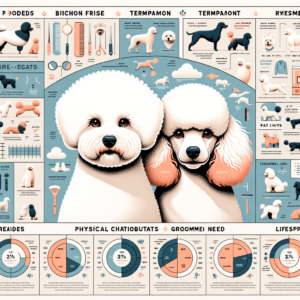
When it comes to choosing a pet, it’s essential to understand the breed’s characteristics and history. This article will provide an introduction to two popular breeds: the Bichon Frise and the Poodle. Both breeds have unique traits that make them stand out. Let’s delve into the details.
-
- Overview of Bichon Frise and Poodle breed information
The Bichon Frise and the Poodle are both known for their friendly and intelligent nature. The Bichon Frise, with its fluffy white coat and playful personality, is a small breed that is great for families and individuals. On the other hand, the Poodle comes in three sizes: standard, miniature, and toy. Poodles are known for their intelligence and elegance. They are versatile dogs that excel in various activities, including obedience, agility, and hunting.
-
- Origins of Bichon Frise and Poodle breeds
The Bichon Frise originated in the Mediterranean area. The breed’s ancestors were used as sailing dogs by the Phoenicians, and the dogs we know today were developed in France and Spain. You can read more about the history of the Bichon Frise on Wikipedia.
The Poodle, on the other hand, is often associated with France, but its earlier ancestors are believed to have come from Germany. The breed was initially used as a water retriever, and its unique coat was designed to protect the dog from the cold water while allowing it to swim effectively. More details about the Poodle’s history can be found on Wikipedia.
In the following sections, we will delve deeper into the characteristics of both the Bichon Frise and the Poodle, compare the two breeds, and provide case studies of these dogs in different environments. Stay tuned to learn more about these fascinating breeds and how to choose the right one for you.
Bichon Frise Characteristics
-
Physical Characteristics of Bichon Frise
The Bichon Frise is a small breed, typically weighing between 10 to 20 pounds. They have a distinctive fluffy white coat that gives them a charming, teddy bear-like appearance. Their eyes are dark and expressive, and their ears are covered with long hair. Their body is compact, but they are quite sturdy for their size. Learn more about their physical characteristics here.
-
Bichon Frise Temperament
Bichon Frises are known for their cheerful and friendly temperament. They are sociable dogs that love to be the center of attention. They are also quite intelligent and can be trained easily. However, they can be a bit stubborn at times. Bichon Frises are great with children and other pets, making them an excellent choice for families. Read more about their temperament here.
-
Bichon Frise Grooming Requirements
Bichon Frises require regular grooming to maintain their fluffy coats. They should be brushed daily to prevent matting and tangling. Regular baths are also necessary to keep their white coats clean. Trimming their hair is also required every 4-6 weeks. Despite their grooming needs, Bichon Frises are hypoallergenic, making them suitable for people with allergies. Find out more about their grooming requirements here.
-
Bichon Frise Size and Lifespan
Bichon Frises are small dogs, typically standing between 9.5 to 11.5 inches tall at the shoulder. They have a relatively long lifespan, with many living into their mid to late teens. Some Bichon Frises have even been known to live into their early twenties. Discover more about their size and lifespan here.
Poodle Breed Traits
The Poodle is a popular breed known for its distinctive curly coat, intelligence, and elegant appearance. Let’s delve into the key traits of this breed:
-
- Physical traits of Poodle
Poodles come in three sizes: standard, miniature, and toy, but all share a similar physical structure. They are well-proportioned and squarely built with a long, straight muzzle. Their eyes are dark and oval-shaped, expressing an alert and intelligent demeanor. The most distinctive feature of Poodles is their curly, dense coat which comes in a variety of colors such as white, black, apricot, and gray. Learn more about Poodle’s physical traits on Wikipedia.
-
- Poodle temperament
Poodles are known for their intelligence and eagerness to please, making them highly trainable. They are generally friendly, social, and get along well with children and other pets. However, they can be shy around strangers and may require early socialization. Poodles are also known for their loyalty and can become very attached to their families.
-
- Poodle grooming requirements
The Poodle’s curly coat requires regular grooming to prevent matting and tangling. This includes brushing at least every other day and professional grooming every 4-6 weeks. Poodles are considered a hypoallergenic breed, but they still shed minimally. Regular bathing is also necessary to keep their skin and coat healthy.
-
- Poodle size and lifespan
The size of a Poodle can vary greatly depending on the variety. Standard Poodles typically stand over 15 inches tall at the shoulder and weigh between 40-70 pounds. Miniature Poodles stand 10-15 inches tall and weigh 10-15 pounds, while Toy Poodles stand under 10 inches tall and weigh 4-6 pounds. Poodles have a relatively long lifespan, with an average of 12-15 years for Standard Poodles and up to 14-16 years for Miniature and Toy Poodles.
Bichon Frise vs Poodle Comparison
When it comes to choosing between a Bichon Frise and a Poodle, it’s important to understand their similarities and differences. Let’s first look at what these two breeds have in common.
Similarities between Bichon Frise and Poodle
Despite being different breeds, Bichon Frise and Poodles share a number of similarities. Here are a few key ones:
-
- Similarity in size
Both Bichon Frise and Poodles are small to medium-sized dogs. The Bichon Frise typically weighs between 10 to 20 pounds, while the Poodle comes in three sizes: toy, miniature, and standard. The toy and miniature Poodles are similar in size to the Bichon Frise.
-
- Similarity in temperament
Bichon Frise and Poodles are both known for their friendly and intelligent nature. They are sociable dogs that enjoy being around people and other pets. They are also quick learners, making them easy to train.
-
- Similarity in grooming requirements
Both breeds have curly, hypoallergenic coats that require regular grooming. They need to be brushed daily to prevent matting and tangling, and professional grooming every 4 to 6 weeks is recommended.
-
- Similarity in lifespan
Bichon Frise and Poodles both have a long lifespan compared to other breeds. Bichon Frise typically live between 14 to 15 years, while Poodles can live anywhere from 10 to 18 years, depending on their size.
Understanding these similarities can help you make an informed decision when choosing between a Bichon Frise and a Poodle. However, it’s also important to consider the differences, which we will discuss in the next section.
Differences between Bichon Frise and Poodle
- Difference in physical characteristics
The Bichon Frise and Poodle may seem similar at first glance, but there are some distinct differences in their physical characteristics. Bichon Frises have a round skull, a slightly arched neck, and a tail that is carried over the back. Their coat is curly and mostly white. On the other hand, Poodles come in three sizes: standard, miniature, and toy, and have a more athletic build. Their coat can be curly or corded and comes in a variety of colors, including white, black, apricot, and gray. [source] [source] - Difference in temperament
While both breeds are known for their friendly and affectionate nature, there are some differences in their temperament. Bichon Frises are known for their cheerful disposition and love of play. They are very sociable and get along well with children and other pets. Poodles, on the other hand, are intelligent and eager to please. They are known for their trainability and often excel in obedience training. [source] [source] - Difference in grooming requirements
Both Bichon Frise and Poodle require regular grooming due to their curly coats. However, Poodles may require more frequent grooming and clipping to keep their coat in good condition. Bichon Frises, on the other hand, have a double coat that doesn’t shed much, but they still require regular brushing to prevent matting. [source] [source] - Difference in size and lifespan
The size of a Poodle can vary greatly, depending on whether it’s a standard, miniature, or toy variety. Standard Poodles can weigh up to 70 pounds and stand over 15 inches tall at the shoulder, while toy Poodles weigh only 4 to 6 pounds and stand under 10 inches tall. Bichon Frises are smaller, typically weighing between 10 and 20 pounds and standing about 9 to 11 inches tall. As for lifespan, both breeds typically live into their teens, but Bichon Frises often live a bit longer, with many reaching 15 years or more. [source] [source]
Case Studies: Bichon Frise and Poodle in Different Environments
Let’s delve into some real-life examples of how Bichon Frise and Poodles adapt to different living conditions. We’ll look at a Bichon Frise in a family setting and a Poodle in a single-person household.
-
Case Study of Bichon Frise in a Family Environment
The Bichon Frise, named Fluffy, was introduced to a family of five. The family included three children aged between 6 and 12. Fluffy quickly became a beloved member of the household. With its friendly and playful nature, it was able to form strong bonds with all family members, especially the children. The family reported that Fluffy was easy to train and had a cheerful demeanor, making it a great fit for their lively household. Fluffy’s small size also made it easy for the family to accommodate it in their home. This case study illustrates the Bichon Frise’s adaptability and suitability for family environments. For more information about Bichon Frise, you can visit Wikipedia.
-
Case Study of Poodle in a Single-Person Household
In contrast, we have Max, a Poodle living with a single adult. Max’s owner reported that Max was an excellent companion. Poodles are known for their intelligence and Max was no exception. He quickly learned commands and was easy to train. Max’s owner also noted that Max was very affectionate and loyal, always staying close by his side. Despite being the only pet in the house, Max was content and showed no signs of loneliness or anxiety. This case study shows that Poodles can thrive in single-person households. For more information about Poodles, you can visit Wikipedia.
In conclusion, both Bichon Frise and Poodles can adapt to different environments and make excellent pets. The choice between the two breeds depends on your personal preferences and living conditions.
Key Takeaways: Choosing Between Bichon Frise and Poodle
- Consideration of temperament: When choosing between a Bichon Frise and a Poodle, it’s important to consider their temperaments. Bichon Frises are known for their cheerful and playful nature, making them great companions for families with children. They are also known to be sociable and love being the center of attention. On the other hand, Poodles are intelligent and easy to train, but they can be reserved with strangers. They are good for families who prefer a more calm and composed pet. Read more about Bichon Frise temperament here and Poodle temperament here.
- Consideration of grooming requirements: Both Bichon Frises and Poodles require regular grooming due to their curly coats. However, Poodles may require more frequent grooming sessions as their hair grows faster. Bichon Frises, on the other hand, have a double coat that doesn’t shed much, but it can mat if not brushed regularly. Therefore, if you’re not ready for frequent grooming sessions, a Bichon Frise might be a better choice.
- Consideration of size and lifespan: Bichon Frises are generally smaller than Poodles, making them more suitable for apartment living. They typically live between 12-15 years, while Poodles can live up to 10-18 years depending on their size. Poodles come in three sizes: toy, miniature, and standard, giving you more options to choose from based on your living situation and lifestyle.
- Consideration of personal lifestyle and environment: Lastly, your lifestyle and environment play a crucial role in your choice. If you live in an apartment and lead a relatively quiet life, a Bichon Frise may be a better fit. However, if you have a large yard and enjoy outdoor activities, a Poodle might be more suitable as they are more active and require more exercise.
